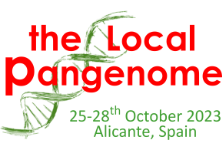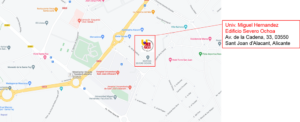Program
Program
25th – 28th October 2023 | Alicante, Spain
UNIVERSIDAD MIGUEL HERNÁNDEZ
Edificio Severo Ochoa / Severo Ochoa Building
| Wednesday, October 25, 2023 | ||||||||||||||||||||||||||||||||||||||||||||||||||||||||||||||||||||||||||||||||||
| 15.30-19.15 | Registration | ||||||||||||||||||||||||||||||||||||||||||||||||||||||||||||||||||||||||||||||||||
| 16.30 | Francisco Rodriguez-Valera (University Miguel Hernández, San Juan de Alicante, Spain) | ||||||||||||||||||||||||||||||||||||||||||||||||||||||||||||||||||||||||||||||||||
| Why the Local-Pangenome? Welcoming address | ||||||||||||||||||||||||||||||||||||||||||||||||||||||||||||||||||||||||||||||||||
| 17.15-19.15 | Session 1. Defining the Pangenome | Chair: Eduardo Rocha | ||||||||||||||||||||||||||||||||||||||||||||||||||||||||||||||||||||||||||||||||||
| 17.15-17.45. Kostas Konstantinidis (Georgia Institute of Technology, USA) | ||||||||||||||||||||||||||||||||||||||||||||||||||||||||||||||||||||||||||||||||||
| Comparative omics reveals an ANI-gap within species to define strains and the mechanism that underlies the species and subspecies gaps | ||||||||||||||||||||||||||||||||||||||||||||||||||||||||||||||||||||||||||||||||||
| 17.45-18.15. Ramunas Stepanauskas (Bigelow Laboratory for Ocean Sciences, USA). | ||||||||||||||||||||||||||||||||||||||||||||||||||||||||||||||||||||||||||||||||||
| Microbiome-wide rate and phylogenetic range of lateral gene transfer in marine prokaryoplankton | ||||||||||||||||||||||||||||||||||||||||||||||||||||||||||||||||||||||||||||||||||
| 18.15-18.45. Matthew Kellom (JGI, USA) | ||||||||||||||||||||||||||||||||||||||||||||||||||||||||||||||||||||||||||||||||||
| Metagenome-assembled genomes, isolate genomes, and pangenomics in large-scale data | ||||||||||||||||||||||||||||||||||||||||||||||||||||||||||||||||||||||||||||||||||
| 18.45-19.15. Martin Polz (Vienna, Austria) | ||||||||||||||||||||||||||||||||||||||||||||||||||||||||||||||||||||||||||||||||||
| Defining the role of the pangenome within a population genomic framework | ||||||||||||||||||||||||||||||||||||||||||||||||||||||||||||||||||||||||||||||||||
| 20.00. Welcome. Informal gathering with drinks and food – Castillo de Santa Bárbara (BUS) | ||||||||||||||||||||||||||||||||||||||||||||||||||||||||||||||||||||||||||||||||||
| Thursday, October 26, 2023 | ||||||||||||||||||||||||||||||||||||||||||||||||||||||||||||||||||||||||||||||||||
| 09.00-11.00. Session 2. Genomics of the Pangenome | Chair: Tal Dagan | ||||||||||||||||||||||||||||||||||||||||||||||||||||||||||||||||||||||||||||||||||
| 9.00-9.30. Federico Rosconi (Biology Department, Boston College, USA) | ||||||||||||||||||||||||||||||||||||||||||||||||||||||||||||||||||||||||||||||||||
| Bacterial pangenomes shape essentiality and gene-phenotype associations | ||||||||||||||||||||||||||||||||||||||||||||||||||||||||||||||||||||||||||||||||||
| 9.30-10.00. Aitor Blanco-Míguez (University of Trento, Italy) | ||||||||||||||||||||||||||||||||||||||||||||||||||||||||||||||||||||||||||||||||||
| A large-scale pangenome-based framework for improved meta-omics profiling | ||||||||||||||||||||||||||||||||||||||||||||||||||||||||||||||||||||||||||||||||||
| 10.00-10.30. Eduardo Rocha (Institute Pasteur, Paris, France) | ||||||||||||||||||||||||||||||||||||||||||||||||||||||||||||||||||||||||||||||||||
| The contribution of interactions between mobile elements to the bacterial pangenome | ||||||||||||||||||||||||||||||||||||||||||||||||||||||||||||||||||||||||||||||||||
| 10.30-11.00. Yusuke Okazaki (Kyoto University, Japan) | ||||||||||||||||||||||||||||||||||||||||||||||||||||||||||||||||||||||||||||||||||
| Single-cell genomics uncovers microbial genomic microdiversity and virus-host interactions that had eluded high-resolution metagenomics | ||||||||||||||||||||||||||||||||||||||||||||||||||||||||||||||||||||||||||||||||||
| 11.00-11.30 | Coffee Break | ||||||||||||||||||||||||||||||||||||||||||||||||||||||||||||||||||||||||||||||||||
| 11.30-13.30. Session 3. Evolution of the pangenome | Chair: Martin Polz | ||||||||||||||||||||||||||||||||||||||||||||||||||||||||||||||||||||||||||||||||||
| 11.30-12.00. Moritz Buck | ||||||||||||||||||||||||||||||||||||||||||||||||||||||||||||||||||||||||||||||||||
| Pangenome traits across Bacteria and Archaea: from genome sizes to functions | ||||||||||||||||||||||||||||||||||||||||||||||||||||||||||||||||||||||||||||||||||
| 12.00-12.30. Alex Mira (FISABIO, Valencia, Spain) | ||||||||||||||||||||||||||||||||||||||||||||||||||||||||||||||||||||||||||||||||||
| Do Darwinian evolutionary principles apply to prokaryotes? | ||||||||||||||||||||||||||||||||||||||||||||||||||||||||||||||||||||||||||||||||||
| 12.30-13.00. Tal Dagan (University of Kiel, Germany) | ||||||||||||||||||||||||||||||||||||||||||||||||||||||||||||||||||||||||||||||||||
| Pangenomes as documents of the species evolutionary history | ||||||||||||||||||||||||||||||||||||||||||||||||||||||||||||||||||||||||||||||||||
| 13.00-13.30. Carolina A. Martinez-Gutierrez (University of North Carolina, Greensboro, USA) | ||||||||||||||||||||||||||||||||||||||||||||||||||||||||||||||||||||||||||||||||||
| Prevalence and Evolutionary Implications of Genome Rearrangements in Bacteria and Archaea | ||||||||||||||||||||||||||||||||||||||||||||||||||||||||||||||||||||||||||||||||||
| 13.30-14.30 | Lunch Break | ||||||||||||||||||||||||||||||||||||||||||||||||||||||||||||||||||||||||||||||||||
| 14.30-16.30 Session 4. Ecology and the pangenome | Chair: Kostas Konstantinidis | ||||||||||||||||||||||||||||||||||||||||||||||||||||||||||||||||||||||||||||||||||
| 14.30-15.00. Mattias Hotzinger (Swedish University of Agricultural Sciences, Uppsala, Sweden) | ||||||||||||||||||||||||||||||||||||||||||||||||||||||||||||||||||||||||||||||||||
| The bipartite flexible genome of a freshwater bacterial species – Strain individuality and additive phyisological functions | ||||||||||||||||||||||||||||||||||||||||||||||||||||||||||||||||||||||||||||||||||
| 15.00-15.30. Joshua Hamm (NIOZ Texel, The Netherlands) | ||||||||||||||||||||||||||||||||||||||||||||||||||||||||||||||||||||||||||||||||||
| Strain-level variation alters host-symbiont interaction dynamics in the Halorubrum lacusprofundi – Candidatus Nanohaloarchaeum antarcticus system | ||||||||||||||||||||||||||||||||||||||||||||||||||||||||||||||||||||||||||||||||||
| 15.30-16.00. Jose Haro-Moreno (University Miguel Hernandez, San Juan de Alicante, Spain) | ||||||||||||||||||||||||||||||||||||||||||||||||||||||||||||||||||||||||||||||||||
|
O-antigen diversity in the Order Pelagibacterales |
||||||||||||||||||||||||||||||||||||||||||||||||||||||||||||||||||||||||||||||||||
| 16.00-16.30. Pedro J. Cabello-Yeves (University of Warwick, UK) | ||||||||||||||||||||||||||||||||||||||||||||||||||||||||||||||||||||||||||||||||||
| Why do alpha-cyanobacteria with form 1A RuBisCO dominate aquatic habitats worldwide? | ||||||||||||||||||||||||||||||||||||||||||||||||||||||||||||||||||||||||||||||||||
|
16.30-17.00 | Coffe Break |
||||||||||||||||||||||||||||||||||||||||||||||||||||||||||||||||||||||||||||||||||
17.00-19.30. Flash talks I (5 min) | Chair: Joshua Hamm
|
||||||||||||||||||||||||||||||||||||||||||||||||||||||||||||||||||||||||||||||||||
|
|
||||||||||||||||||||||||||||||||||||||||||||||||||||||||||||||||||||||||||||||||||
| 09.00-11.00. Session. 5. Ecology II | Chair: Ramunas Stapanauskas | ||||||||||||||||||||||||||||||||||||||||||||||||||||||||||||||||||||||||||||||||||
| 9.00-9.30. Rachel Whitaker (University of Illinois, Urbana-Champaign, USA) | ||||||||||||||||||||||||||||||||||||||||||||||||||||||||||||||||||||||||||||||||||
| Contributions of multiscale symbiosis to the dynamics of pangenome | ||||||||||||||||||||||||||||||||||||||||||||||||||||||||||||||||||||||||||||||||||
| 9.30-10.00. Jose de la Torre (San Francisco State University, USA) | ||||||||||||||||||||||||||||||||||||||||||||||||||||||||||||||||||||||||||||||||||
| Population-level genome dynamics of archaea in hot spring microbial communities | ||||||||||||||||||||||||||||||||||||||||||||||||||||||||||||||||||||||||||||||||||
| 10.00-10.30. Felipe Coutinho (CSIC-ICM, Barcelona, Spain) | ||||||||||||||||||||||||||||||||||||||||||||||||||||||||||||||||||||||||||||||||||
| A deep dive into the genomic diversity of marine Archaea and Bacteria | ||||||||||||||||||||||||||||||||||||||||||||||||||||||||||||||||||||||||||||||||||
| 10.30-11.00. Zaki Saati-Santamaría (Czech Academy of Sciences, Prague, Czech Republic) | ||||||||||||||||||||||||||||||||||||||||||||||||||||||||||||||||||||||||||||||||||
| Analysis of the prokaryotic genome evolution within a 5.5 million years trapped chemolithotrophic cave | ||||||||||||||||||||||||||||||||||||||||||||||||||||||||||||||||||||||||||||||||||
| 11.00-11.30 | Coffee Break | ||||||||||||||||||||||||||||||||||||||||||||||||||||||||||||||||||||||||||||||||||
| 11.30-13.30. Sesion 6. Dynamics of the pangenome | Chair: Jose Penadés | ||||||||||||||||||||||||||||||||||||||||||||||||||||||||||||||||||||||||||||||||||
| 11.30-12.00. Miguel Rodriguez Rojas (University of Innsbruck, Austria) | ||||||||||||||||||||||||||||||||||||||||||||||||||||||||||||||||||||||||||||||||||
| Quantifying genetic variation at the edge of metagenomic resolution to characterize in situ population dynamics | ||||||||||||||||||||||||||||||||||||||||||||||||||||||||||||||||||||||||||||||||||
| 12.00-12.30. Fiona J. Whelan (University of Nottingham, UK) | ||||||||||||||||||||||||||||||||||||||||||||||||||||||||||||||||||||||||||||||||||
| Gene-gene associations and the role of selection in microbial pangenomes | ||||||||||||||||||||||||||||||||||||||||||||||||||||||||||||||||||||||||||||||||||
| 12.30-13.00. Franz Baumdicker (University of Tübingen, Germany) | ||||||||||||||||||||||||||||||||||||||||||||||||||||||||||||||||||||||||||||||||||
| Common misconceptions when disentangling the processes that shape pangenomes | ||||||||||||||||||||||||||||||||||||||||||||||||||||||||||||||||||||||||||||||||||
| 13.00-13.30. Mario Rodríguez Mestre (INIA-CSIC, Madrid, Spain) | ||||||||||||||||||||||||||||||||||||||||||||||||||||||||||||||||||||||||||||||||||
| Regions of Genome Plasticity: A Comparative Analysis of Mobility and Retention Patterns in Bacterial and Archaeal Pangenomes | ||||||||||||||||||||||||||||||||||||||||||||||||||||||||||||||||||||||||||||||||||
| 13:30-14:30 | Lunch Break | ||||||||||||||||||||||||||||||||||||||||||||||||||||||||||||||||||||||||||||||||||
| 14.30-16.30. Session 7. Pangenomes of animal/plant denizens | Chair: Rafal Mostowy | ||||||||||||||||||||||||||||||||||||||||||||||||||||||||||||||||||||||||||||||||||
| 14.30-15.00. Aiswarya Prasad (University of Lausanne, Switzerland) | ||||||||||||||||||||||||||||||||||||||||||||||||||||||||||||||||||||||||||||||||||
| Variation and specialization of structure and function of gut microbial community across host species | ||||||||||||||||||||||||||||||||||||||||||||||||||||||||||||||||||||||||||||||||||
| 15.00-15.30. Jaime Iranzo (University Politecnica Madrid, Spain) | ||||||||||||||||||||||||||||||||||||||||||||||||||||||||||||||||||||||||||||||||||
| High-order metabolic interdependencies dominate the human gut microbiome | ||||||||||||||||||||||||||||||||||||||||||||||||||||||||||||||||||||||||||||||||||
| 15.30-16.00. Anne Kupczok (Wageningen University, The Netherlands) | ||||||||||||||||||||||||||||||||||||||||||||||||||||||||||||||||||||||||||||||||||
| Large-scale investigation of orphan genes in the human gut microbiome elucidates their evolutionary origins | ||||||||||||||||||||||||||||||||||||||||||||||||||||||||||||||||||||||||||||||||||
| 16.00-16.30. Sheila Roitman (Max Planck Institute for Biology, Tuebingen, Germany) | ||||||||||||||||||||||||||||||||||||||||||||||||||||||||||||||||||||||||||||||||||
| Expanding the plant holobiont | ||||||||||||||||||||||||||||||||||||||||||||||||||||||||||||||||||||||||||||||||||
| 16.30-17.00 | Coffe Break | ||||||||||||||||||||||||||||||||||||||||||||||||||||||||||||||||||||||||||||||||||
| 17.00-19.15 Flash talks II | Chair: Alex Mira | ||||||||||||||||||||||||||||||||||||||||||||||||||||||||||||||||||||||||||||||||||
|
||||||||||||||||||||||||||||||||||||||||||||||||||||||||||||||||||||||||||||||||||
| Saturday, October 28, 2023 | ||||||||||||||||||||||||||||||||||||||||||||||||||||||||||||||||||||||||||||||||||
| 09.00-11.00. Session 8. Phages and pangenome | Chair: Manuel Martínez García | ||||||||||||||||||||||||||||||||||||||||||||||||||||||||||||||||||||||||||||||||||
| 9.00-9.30. Jose Penades (Imperial College London, UK) | ||||||||||||||||||||||||||||||||||||||||||||||||||||||||||||||||||||||||||||||||||
| Redefining mobility in bacterial genetics and its impact on infectious disease | ||||||||||||||||||||||||||||||||||||||||||||||||||||||||||||||||||||||||||||||||||
| 9.30-10.00. Rafal Mostowy (Jagiellonian University, Kraków, Poland) | ||||||||||||||||||||||||||||||||||||||||||||||||||||||||||||||||||||||||||||||||||
| Using a pan-genome approach to better understand how phages interact and coevolve with bacterial hosts | ||||||||||||||||||||||||||||||||||||||||||||||||||||||||||||||||||||||||||||||||||
| 10.00-10.30. Chris Bellas (University of Innsbruck, Austria) | ||||||||||||||||||||||||||||||||||||||||||||||||||||||||||||||||||||||||||||||||||
| Bacteriophage pangenomes from metagenomes | ||||||||||||||||||||||||||||||||||||||||||||||||||||||||||||||||||||||||||||||||||
| 10.30-11.00. Maite Muniesa (University of Barcelona) | ||||||||||||||||||||||||||||||||||||||||||||||||||||||||||||||||||||||||||||||||||
| Unveiling the expansive pangeome of Crassvirales: Novel CrAss-like phage isolates reveal genetic heterogeneity and worldwide distribution | ||||||||||||||||||||||||||||||||||||||||||||||||||||||||||||||||||||||||||||||||||
| 11:00-11:30 | Coffee Break | ||||||||||||||||||||||||||||||||||||||||||||||||||||||||||||||||||||||||||||||||||
| 11:30-12:30 | Closing keynote lecture | ||||||||||||||||||||||||||||||||||||||||||||||||||||||||||||||||||||||||||||||||||
| Eugene Koonin (National Center for Biotechnology Information, Bethesda, USA) | ||||||||||||||||||||||||||||||||||||||||||||||||||||||||||||||||||||||||||||||||||
The Virosphere: Megataxonomy and Global Ecology
|
||||||||||||||||||||||||||||||||||||||||||||||||||||||||||||||||||||||||||||||||||

